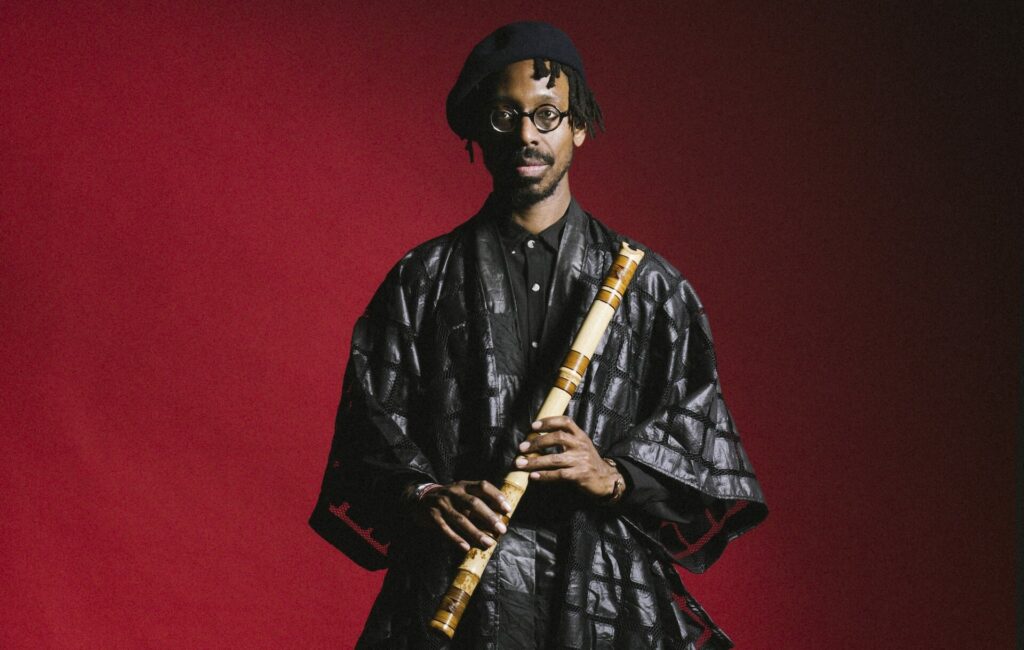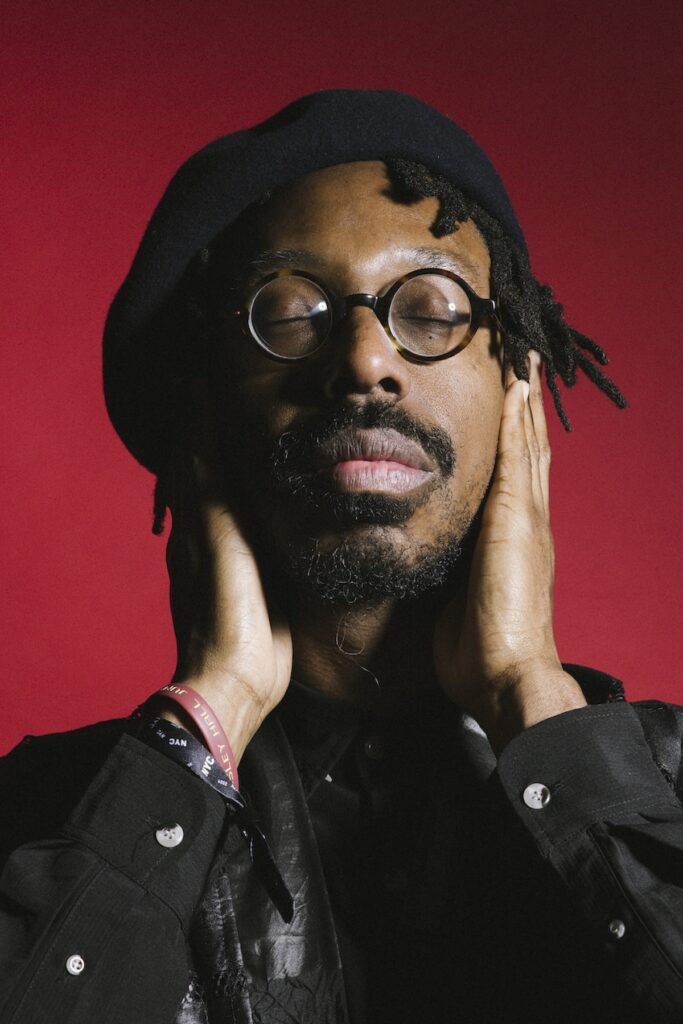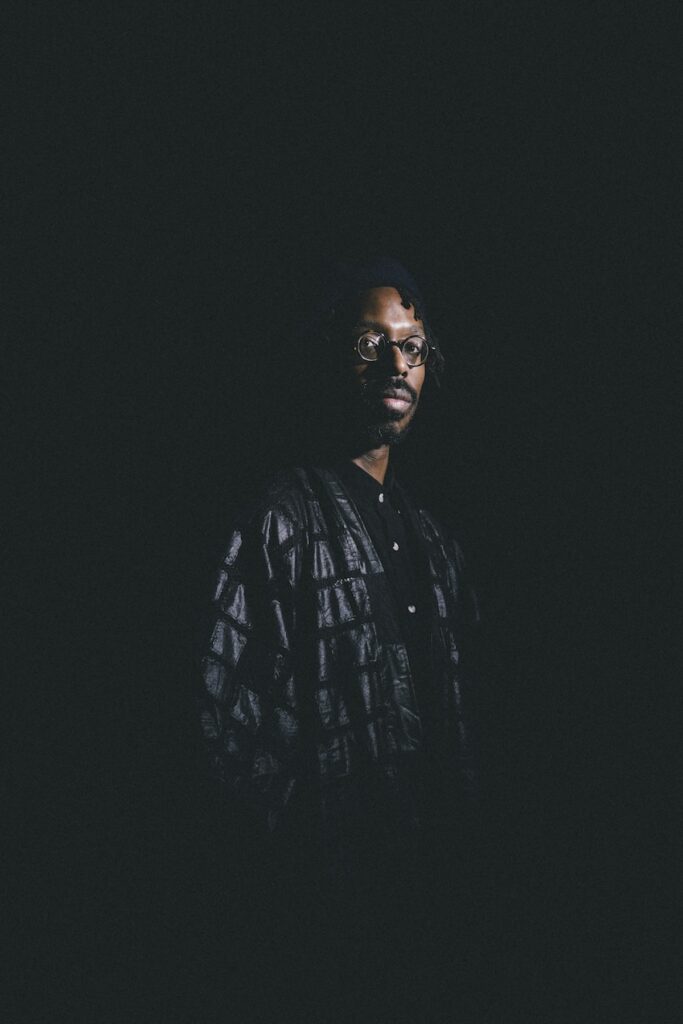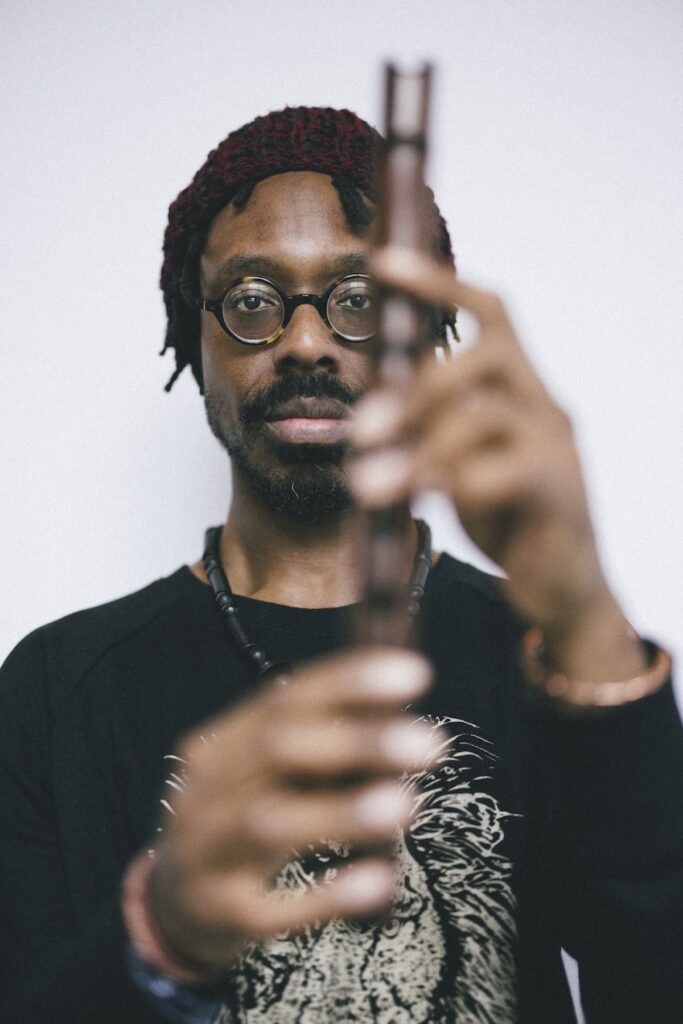Shabaka on leaving the saxophone: ‘Something profound happens when you know the end is coming’
“If I was still playing the sax, it’d be so easy,” the former Sons of Kemet and The Comet is Coming bandleader admits. On stunning debut album ‘Perceive Its Beauty, Acknowledge Its Grace’, he turns to the flute and follows a spiritual compulsion to take a new path.

On New Year’s Day 2023, Shabaka Hutchings shared a message with fans, revealing that last year would see his final performances on the saxophone, the instrument on which he made his name. “I look forward to approaching each remaining show I do on it this year with the magic and intensity which a spirit of closure and intention can bring to musical proceedings,” he wrote at the time.
Through his bands Sons of Kemet, The Comet is Coming and Shabaka and the Ancestors, the musician became a spearhead for a London jazz scene revered across the globe, picking up Mercury Prize nominations and universal critical acclaim. His superbly energetic playing turned jazz gigs into dance parties and ushered in an era of renewed appreciation for the genre in Britain, especially among younger fans.
Hints at this sea change had come a few months earlier, in November of 2022, when Shabaka released the EP Afrikan Culture under his own name. It saw him playing the flute, clarinet and more in a shift from rhythmic jazz to something spacier and more New Age.
Followers on social media will have also seen Shabaka – who now goes solely by his first name – sharing videos of himself playing a wide range of flutes and woodwind instruments across the world, often performed in nature. This week, he will release his debut solo album Perceive Its Beauty, Acknowledge Its Grace, a gorgeous continuation of this sound and the latest window into the future of a trailblazing artist.

Speaking from Tennessee after periods of time spent practicing and further exploring the worlds and history of the flute in Barbados and Brazil, Hutchings said he felt he owed it to his fans to announce the forthcoming end of his time on the saxophone. “I don’t like it when artists make these long-term decisions and don’t give anyone a heads up,” he says. “You read about it retrospectively and say, ‘Oh I wish I could have seen my favourite band one last time.’”
What followed was a frenzied and electrically charged final year of gigs with both Sons of Kemet and The Comet is Coming. “Something profound happens when you know the end is coming. There was this feeling of expectation and conclusion around every show,” he explains. “The last three Sons of Kemet gigs are the best shows of my life, in terms of that mythical feeling of giving everything that you can. That’s what you assume you’re supposed to be doing in music every time you go on stage. I realised in those shows that I had no idea what that meant, and you can’t know what that means until you get to a situation where you’re confronted with the fact that the next three gigs are the last time you are going to play this music.”
It also made him think of his heroes, he explains. “I thought, this is what must have been like for The Miles Davis Quintet or John Coltrane’s group. This is what they must have been experiencing every night in terms of that energy and a profound level of listening and deep musical interaction.”
Two of Shabaka’s final performances on the saxophone also nodded perfectly to the past and present of the instrument and the genre. His final gig came in London in December, where he performed the John Coltrane classic A Love Supreme in its entirety. A few months earlier, he had joined Floating Points for a one-off performance of his hugely acclaimed album Promises at the Hollywood Bowl. Shabaka played the parts of the legendary Pharoah Sanders, who had passed away a year earlier.
“I thought it was important to end the period of the saxophone with something that was actually personally very important to me,” he says of choosing A Love Supreme as his farewell performance. “That record is one of my really important records, and a good way to conclude my sojourn with the saxophone for this period of my life.”

Perceive Its Beauty, Acknowledge Its Grace is a beautifully constructed album centred around the flute. For its recording, Shabaka brought in a stellar cast of collaborators including André 3000, Floating Points, Lianne La Havas and Moses Sumney. He says it’s a continuation of the mood and message started on Afrikan Culture, and its title is meant to be read as a continuation of the EP’s: Afrikan Culture, Perceive Its Beauty, Acknowledge Its Grace.
To record it, Shabaka gathered the cast of musicians in the Rudy Van Gelder studio in New Jersey, a place steeped in jazz history. He wanted to instil an improvisational spirit into the recordings and insisted that his collaborators didn’t wear headphones. “I just told everyone, ‘You’ve got to listen to me and be able to hear the flute.’ It’s uncomfortable, and the flute isn’t particularly made to be played loud. It’s meant to express resonance capacity most effectively, but not give a bunch of volume. That level of deep listening was really present.”
By his own admission, he is still learning on the flute and has a significant way to go before he would consider himself a master, like many believed he was of the saxophone. For the musician, documenting this process on record is an important part of moving forwards artistically and tracking the creative journey. It also arrives at a time of wider acknowledgement of the instrument in mainstream circles given the surprise curveball release of André 3000’s New Blue Sun last year, an album Shabaka was involved in sessions for.
“Sometimes, it’s the best that you can give, but you only realise that when you gain more proficiency,” he says of documenting this period of his journey on the flute. “I realised this as well on the sax. The great thing about being a professional musician and then starting from scratch is that you realise the things you need to treasure. One of those things is that exploratory spirit that you have when you haven’t really got your shit together yet.”

In an era of financial uncertainty for recording artists and touring musicians, Shabaka’s decision to hang up the instrument that made him the poster boy for a new generation of British jazz is a brave one. In switching instruments, he says he was answering a call from within against better logistical judgement.
“If I was still playing the sax, it’d be so easy,” he admits. “The bands I was touring with, there was lots of demand and I can really play that instrument.” Despite this, he says he defines an artist as “someone that’s constantly trying to align the inner feelings with the outer expression. How you feel is sometimes different from what’s the most profitable. We might make very effective music, but if that’s not lined with complete integrity, it means that a potential capacity isn’t going to be realised.”
It also aligns with his belief in the purpose of art at large, and this spiritual compulsion to start afresh. “With the world coming to this place of general tension and confusion, the only thing we can do as artists is try to be as sensitive to how we feel [as possible] and go with what our hearts are telling us,” says Shabaka. “Even if things fall flat on your face, you try it and you learn the lesson. The lesson makes you stronger and deeper. That can’t happen if you don’t do what’s in your heart.”
